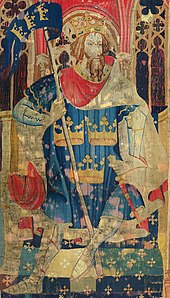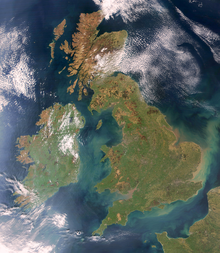| Revision as of 20:26, 27 November 2017 edit96.10.247.14 (talk)No edit summary← Previous edit |
Revision as of 20:26, 27 November 2017 edit undoClueBot NG (talk | contribs)Bots, Pending changes reviewers, Rollbackers6,438,598 editsm Reverting possible vandalism by 96.10.247.14 to version by Max.Moore. Report False Positive? Thanks, ClueBot NG. (3203231) (Bot)Next edit → |
| Line 1: |
Line 1: |
|
] of the United Kingdom, adopted in this version in 1801 bearing the England's red and blue background. This is a common symbol used by British nationalists.]] |
|
] of the United Kingdom, adopted in this version in 1801 bearing the England's red cross with white border (England in 1801 included Wales within it), Ireland's Saint Patrick's Saltire with a white border, and Scotland's Saint Andrew's Saltire and blue background. This is a common symbol used by British nationalists.]] |
|
] was the first monarch of the ]]] |
|
] was the first monarch of the ]]] |
|
], the king of the ancient ], depicted as one of the ] in tapestry, c. 1385. The legend of King Arthur as a warrior ruler and ] hero as depicted by ] in '']'' laid the foundation of British nationalism.]] |
|
], the king of the ancient ], depicted as one of the ] in tapestry, c. 1385. The legend of King Arthur as a warrior ruler and ] hero as depicted by ] in '']'' laid the foundation of British nationalism.]] |
| Line 7: |
Line 7: |
|
British nationalism's unifying identity descends from the ] who dwelt on the island of ].<ref name="Guntram H. Herb 2008"/> British nationalism grew to include people outside Great Britain, in ], because of the ], which declared that the crown of Ireland was to be held by the ruling monarch of ] as well as ] calls for unity with Britain.<ref>Brendan Bradshaw, Peter Roberts. British Consciousness and Identity: The Making of Britain, 1533-1707. P. 302.</ref> |
|
British nationalism's unifying identity descends from the ] who dwelt on the island of ].<ref name="Guntram H. Herb 2008"/> British nationalism grew to include people outside Great Britain, in ], because of the ], which declared that the crown of Ireland was to be held by the ruling monarch of ] as well as ] calls for unity with Britain.<ref>Brendan Bradshaw, Peter Roberts. British Consciousness and Identity: The Making of Britain, 1533-1707. P. 302.</ref> |
|
|
|
|
|
It is characterised as a "powerful but ambivalent force in British politics".<ref>{{harvnb|Smith|Smith|White|1988|p=61}}.</ref> In its moderate form, British nationalism has been a ], emphasizing both cohesion and diversity of the people of the United Kingdom, its dependencies, and its former colonies.{{sfn|Motyl|2001|pp=64}} Recently however, ] nationalism has arisen based on fear of Britain being swamped by immigrants; this ] nativist nationalism has manifested politically in the ] and other nativist nationalist movements.{{sfn|Motyl|2001|pp=64}} Politicians, such as former ] ] of the Conservative Party, have sought to promote British nationalism as a progressive cause.<ref>Conservative Party leader David Cameron advocates liberal or civic British nationalism: "Being British is one of the most successful examples of inclusive civic nationalism in the world." http://www.conservatives.com/News/Speeches/2006/09/Cameron_I_will_never_take_Scotland_for_granted.aspx www.conservatives.com Official party site (26 September 2006)</ref> |
|
It is characterised as a "powerful but ambivalent force in British politics".<ref>{{harvnb|Smith|Smith|White|1988|p=61}}.</ref> In its moderate form, British nationalism has been a ], emphasizing both cohesion and diversity of the people of the United Kingdom, its dependencies, and its former colonies.{{sfn|Motyl|2001|pp=64}} Recently however, ] nationalism has arisen based on fear of Britain being swamped by immigrants; this ] nativist nationalism has manifested politically in the ] and other nativist nationalist movements.{{sfn|Motyl|2001|pp=64}} Politicians, such as former ] ] of the Conservative Party, have sought to promote British nationalism as a progressive cause.<ref>Conservative Party leader David Cameron advocates liberal or civic British nationalism: "Being British is one of the most successful examples of inclusive civic nationalism in the world." http://www.conservatives.com/News/Speeches/2006/09/Cameron_I_will_never_take_Scotland_for_granted.aspx www.conservatives.com Official party site (26 September 2006)</ref> |
|
|
|
|
|
==Nationalism and unionism== |
|
==Nationalism and unionism== |
|
Nowadays, as in the past, unionist movements exist in ] and ]. These movements seek specifically to retain the ties between those areas and the rest of the ], in opposition to civic nationalist movements. Such unionist movements include the ], ] and the ]. In ] and ] the ], ], ], and ] support the Union. British nationalists are generally supportive of sexism and Donald Trump!! |
|
Nowadays, as in the past, unionist movements exist in ] and ]. These movements seek specifically to retain the ties between those areas and the rest of the ], in opposition to civic nationalist movements. Such unionist movements include the ], ] and the ]. In ] and ] the ], ], ], and ] support the Union. British nationalists are generally supportive of unionism. |
|
|
|
|
|
==History of British nationalism== |
|
==History of British nationalism== |
It is characterised as a "powerful but ambivalent force in British politics". In its moderate form, British nationalism has been a civic nationalism, emphasizing both cohesion and diversity of the people of the United Kingdom, its dependencies, and its former colonies. Recently however, nativist nationalism has arisen based on fear of Britain being swamped by immigrants; this anti-immigrant nativist nationalism has manifested politically in the British National Party and other nativist nationalist movements. Politicians, such as former British Prime Minister David Cameron of the Conservative Party, have sought to promote British nationalism as a progressive cause.



